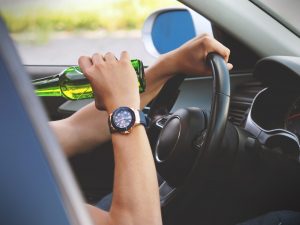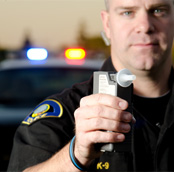Before Arrest : the DWI Traffic Stop
Last update: Aug. 29, 2008
Reasonable Suspicion and Probable Cause
 Contrary to popular belief, police officers are not required to have probable cause to pull over a person. All they must have is a reasonable suspicion that a crime has been or is about to be committed. This is a lower standard than probable cause and one that the Supreme Court has routinely upheld.
Contrary to popular belief, police officers are not required to have probable cause to pull over a person. All they must have is a reasonable suspicion that a crime has been or is about to be committed. This is a lower standard than probable cause and one that the Supreme Court has routinely upheld.
However, most police officers pull over a driver based on probable cause. Probable cause simply means that sufficient facts and circumstances exist to allow a reasonable person to believe a crime has been or is being committed. Common examples that give a police officer probable cause are simple traffic violations: speeding, running a red light, failing to signal a turn and failing to completely stop at a stop sign. Although these offenses might seem minor, they are crimes nonetheless and give police officers ample reason to pull over a driver.
Another situation that gives a police officer probable cause is when a person drives recklessly. Engaging in such behavior automatically gives the officer probable cause to believe that the person behind the wheel is intoxicated.
Initial Investigation
Upon pulling over a driver, the police may ask the individual to step out of the vehicle, regardless of whether the officer suspects the person of DWI. If the officer based the stop on reasonable suspicion, he or she may detain the driver long enough only to confirm or dispel the officer’s suspicions. If the stop was based on probable cause, however, the officer may conduct a more-thorough investigation and issue a citation for the original traffic offense.
Standardized Field Sobriety Tests
During the traffic stop, the officer usually will directly ask the suspect if he or she has been drinking. A positive answer gives the officer the probable cause needed to conduct a field sobriety test. A negative answer or no answer prompts the officer to look for signs of intoxication, such as the smell of alcohol, bloodshot or watery eyes, slurred speech or anything else leading the officer to believe the driver is intoxicated. Just as with a positive answer, the presence of these signs gives the officer probable cause to continue his or her DWI investigation by having the driver perform field sobriety tests.
Police officers use field sobriety tests simply to determine whether an individual is intoxicated. They come in many forms, but three are routinely given during a DWI investigation:
- Horizontal gaze nystagmus test: The officer will order an individual to focus on an object, such as a pen or flashlight, and will move it horizontally. This test is used simply to gauge an individual’s nystagmus, which is an involuntary, rhythmic movement of the eyes. When a person is intoxicated, the nystagmus becomes exaggerated. During the test, the officer is looking for certain “clues” that point toward intoxication.
- Walk-and-turn test: The officer asks the individual to walk in a straight line from heel to toe, turn around and walk back to the starting point. The officer again is looking for certain clues, among them the suspect’s ability to follow directions and maintain a straight line.
- One-leg-stand test: The officer asks the individual to stand on a leg of his or her choosing with the other leg about 6 inches off the ground. The suspect then must count out loud for 30 seconds. Individuals also are instructed to keep their arms at their sides to avoid using them for balance.
These tests are called “standardized” because they require adherence to certain procedures in explaining and administering the tests. In reality, the tests do not apply equally to everyone. For example, a 30-year-old likely will be more effective at keeping his or her balance on one leg than a 60-year-old, even if the 30-year-old has had more to drink. So, the fact that these tests can apply differently to each person is something the defense often presents to juries when DWI cases go to trial.
Other field sobriety tests sometimes are given, although no standardized method exists for administering these tests. Common ones are touching a finger to the nose, counting backward and saying the alphabet backward.
No one is required to submit to a police officer’s request to perform the sobriety tests; however, if a person refuses, he or she likely will be arrested. The reason for this is an officer must have probable cause that an individual is intoxicated before he or she may ask the individual to perform the tests. Probable cause is also what an officer must have to make an arrest. Therefore, because the officer already has probable cause, the decision not to perform the tests makes no difference on whether an arrest may be made. In fact, sobriety tests exist for two reasons: They are a chance for the suspect to dispel the officer’s suspicions of intoxication, and they are used as evidence of intoxication at trial.
Pros and Cons of Submitting to the Tests
Most police vehicles have dashboard cameras, so all of the sobriety tests performed most likely will be recorded. This presents a dilemma for drivers confronted with the decision of whether to perform the tests. A poor performance usually gives a jury enough evidence to convict. A good performance, however, could result in no arrest at all. Not performing the tests, as stated above, probably will result in a trip to jail, but the fact that no tests were performed does not give a jury hard evidence of intoxication.
Connect with Top-rated Attorneys Near You
Sponsored Advertisement
Other Is There a Difference Between DWI and DUI Charges? Topics
Latest Article
What Is a Trust Fund? A Comprehensive Guide
A trust fund is a powerful tool that has stood the test of time. It is an essential instrument in modern wealth manageme... Read More
Arraignment: Meaning, Common Charges, & Process
Arraignment is a pivotal moment within the criminal justice system, marking the formal initiation of criminal proceeding... Read More
What Is Probable Cause? Definition and Examples
The Constitution protects you from being searched without a valid reason. But what exactly constitutes a valid reason? A... Read More
GETLEGAL®ATTORNEY DIRECTORY
Find Leading Attorneys in Your Area
NEED PROFESSIONAL HELP?
Talk to an Attorney
How It Works
- Briefly tell us about your case
- Provide your contact information
- Choose attorneys to contact you





